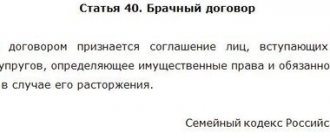Legal regulation of the terms of the contract
Conditions that must be included in employment contracts are established based on the characteristics of the production process. Such requirements are determined by the company's Charter and internal labor regulations. Then, based on the fixed requirements, a universal agreement form is drawn up. Changes to the terms of the contract must occur before employment and before the actual signing of the agreement. Otherwise, it will be possible to make changes to the document only by mutual agreement of the parties to the legal relationship.
Article 56 of the Labor Code stipulates the concept of a working agreement, as well as its significance in the settlement of legal relations. A complete list of mandatory requirements of an employment contract is displayed in Art. 57 Labor Code of the Russian Federation. In addition to the list of essential requirements, there are additional nuances, without which it is impossible to fully conduct official activities.
Labor functions and contract
The labor function of an employee is his immediate responsibilities, described in more detail. They are usually reflected separately in the employee’s job description, but can also be included directly in the employment contract itself.
Labor relations are individualized for a specific employee, depending on the position he occupies and the tasks assigned to him. In this case, the employment contract specifies the specific type of work performed, the scope of job responsibilities, and the limits of emerging responsibilities. If the work assigned to an employee involves the provision of various benefits, compensation and payments established by law, then it is necessary to indicate his position in the labor functions.
What types of contract terms are there?
There are several types of employment contract terms that are used in legal practice. Labor law provisions provide for the following classification of requirements:
- by importance of provisions (mandatory, optional);
- by type of working legal relationship (in relation to fixed-term contracts and open-ended contracts);
- by category of employees (general, individual).
Labor legislation gives employers the right to create individual contract forms based on the intricacies of the work process and the requirements for the functional responsibilities of specific positions.
Essential
Mandatory conditions displayed in the content of the employment contract:
| General provisions | Specific Requirements |
| Place of work | Name and legal address of the enterprise where the candidate will serve. Additionally, the need for transfer between branches of the organization is indicated if this is provided for by production needs. |
| Job responsibilities | All types of positions are divided into two categories based on the presence of harmful or dangerous features of the work. If there are none, then the director can independently come up with job titles. If such conditions exist, the name is indicated only on the basis of fixed standards. |
| Start date of activity | The day of signing the contract does not always coincide with the beginning of the actual performance of official duties. |
| Salary | The employer prescribes the salary amount, the amount of regular accruals, as well as the possibility of receiving additional bonuses and periodic financial accruals. The law establishes deadlines for transferring funds. |
| Working hours | Work shifts and their duration are recorded. Additionally, rules for performing work duties on weekends and holidays are prescribed. |
Additional
Regulatory acts stipulate the following list of optional circumstances:
- the duration of the employment contract (described in the employment agreement only if the contract is signed for a specific period);
- the amount of compensation upon dismissal if, along with mandatory contributions, the employer guarantees optional payments to its specialists;
- special guarantees provided for employees performing duties in specific circumstances (harmful, dangerous);
- requirement to obtain insurance;
- the nature of the activity (this point will be relevant for those categories of production that involve frequent business trips and travel);
- the need to undergo a probationary period (its duration, grounds for termination);
- financial responsibility of participants.
There is no single list of optional conditions in the legislation. The only requirement is that such aspects should not contradict labor laws.
Random
This category includes circumstances that are optional, but mandatory to clarify working conditions in connection with the peculiarities of the production process:
- the procedure for possible payment of penalties;
- equipping workplaces with additional technical equipment;
- provision of a deposit;
- attracting guarantors to work;
- features of termination of temporary work;
- additional insurance of risks associated with work and profit.
All types of conditions are divided into groups and displayed in the agreement in turn, indicating the section number.
You may be interested in : Rules for notifying an employee about changes in the terms of the contract
Contents of the employment contract
The contents of an employment contract are all its terms. They are divided into
- direct (stipulated by the parties directly in the written text of the employment contract);
- derivatives (provided for by law, collective agreement, agreements and, by virtue of the conclusion of an employment contract, applicable to the parties - on the procedure for transfer, dismissal, labor protection rules, etc.).
The employment contract (Article 57 of the Labor Code of the Russian Federation) specifies:
- data allowing to identify the parties to the agreement (full name of the employee and employer-individual; name of the employer; information about identification documents of the employee and employer-individual; TIN for employers; information about the employer’s representative who signed the employment contract, and the basis on which he is vested with the appropriate powers);
- place and date of conclusion of the employment contract.
- place of work (indicating a separate structural unit and its location);
- labor function (work according to the position in accordance with the staffing table, profession, specialty indicating qualifications; specific type of work assigned to the employee);
- terms of remuneration (including the size of the tariff rate or salary (official salary) of the employee, additional payments, allowances and incentive payments);
- working hours and rest hours (if for a given employee it differs from the general rules in force for a given employer);
- compensation for hard work and work under harmful and (or) dangerous working conditions, if the employee is hired under appropriate conditions, indicating the characteristics of working conditions in the workplace;
- conditions that determine the nature of the work (mobile, traveling, on the road, other nature of work);
- a condition on compulsory social insurance of the employee in accordance with the Code and other federal laws;
- other conditions in cases provided for by labor legislation and other regulatory legal acts containing labor law norms.
start date of work (validity period of a fixed-term employment contract and the circumstances (reasons) that served as the basis for its conclusion in accordance with the Code or other federal law);
If, when concluding an employment contract, it did not include any information and (or) conditions from those provided for in Art. 57 of the Labor Code of the Russian Federation, this is not a basis for recognizing the employment contract as not concluded or for its termination. The employment contract must be supplemented with missing information and (or) conditions, while the missing information is entered directly into the text of the employment contract, and the missing conditions are determined by an annex to the employment contract or a separate agreement of the parties, concluded in writing, which are an integral part of the employment contract.
The employment contract may provide for additional conditions that do not worsen the employee’s position in comparison with established labor legislation and other regulatory legal acts containing labor law norms, collective agreements, agreements, local regulations, in particular:
- on clarification of the place of work (indicating the structural unit and its location) and (or) the workplace;
- about the test;
- on the employee’s obligation to work after training for no less than the period established by the contract, if the training was carried out at the expense of the employer;
- on the types and conditions of additional employee insurance;
- on improving the social and living conditions of the employee and his family members;
- on clarification, in relation to the working conditions of a given employee, of the rights and obligations of the employee and the employer established by labor legislation and other regulatory legal acts containing labor law norms.
on non-disclosure of secrets protected by law (state, official, commercial and other);
By agreement of the parties, the employment contract may also include the rights and obligations of the employee and employer established by labor legislation and other regulatory legal acts containing labor law norms, local regulations, as well as the rights and obligations of the employee and employer arising from the terms of the collective agreement and agreements . Failure to include any of the specified rights and (or) obligations of the employee and employer in the employment contract cannot be considered as a refusal to exercise these rights or fulfill these obligations.
According to Art. 60 of the Labor Code of the Russian Federation, it is prohibited to require an employee to perform work not stipulated by an employment contract, except for cases provided for by the Labor Code of the Russian Federation and other federal laws.
The terms of an employment contract can only be changed by agreement of the parties in writing.
Contract terms that worsen the situation of workers in comparison with labor legislation are invalid.
0
Rights and responsibilities of an employee
The terms of the agreement provide a list of rights and obligations of participants:
| Possibilities | Liabilities |
|
|
Rights and obligations of the employer
There is no single list of rights and obligations, the observance of which is mandatory for the employer. The director of the company can hope to ensure the following rights:
- signing an agreement with desired applicants;
- making amendments to current contracts by agreement of the participants and only within the framework of the law;
- obtaining expected work results from hired employees;
- submitting an initiative to convene a commission for the consideration of collective disputes;
- assessing the professional qualities of employees.
You may be interested in : How long is a fixed-term employment contract?
Article 22 of the Labor Code of the Russian Federation establishes the main responsibilities of the employer. These include:
- compliance with legal regulations;
- providing access to job responsibilities;
- guarantees of compliance with safety standards for employees;
- equipping with special equipment necessary for work;
- timely payment of wages;
- social insurance;
- reimbursement of all compensation.
Before starting cooperation, the contents of the contract must reflect mutual rights and obligations. Not all aspects may be covered in the agreement. If conflict situations arise, you will have to be guided by the code and the norms of other legislative acts.
Iskusstvoed.ru – network resource about culture and art
Views: 5,691
An employment contract is an agreement between an employer and an employee, according to which the employer undertakes to provide the employee with work for a specified job function, provide working conditions, pay the employee wages on time and in full, and the employee undertakes to personally perform this job function and comply with the rules in force in the organization internal labor regulations.
The parties are the employer and the employee.
The employment contract is concluded in writing, in two copies, which are signed by the parties. One copy of the contract is given to the employee, the other is kept by the employer.
According to Article 57 of the Labor Code of the Russian Federation, the following information is indicated in the employment contract:
- last name, first name, patronymic of the employee and name of the employer (last name, first name, patronymic of the employer - an individual) who entered into an employment contract;
— information about identity documents of the employee and the employer - an individual who entered into an employment contract;
— information about documents proving the identity of the employee and the employer - an individual;
— taxpayer identification number (for employers, with the exception of employers - individuals who are not individual entrepreneurs);
— information about the employer’s representative who signed the employment contract, and the basis on which he is vested with the appropriate powers;
— place and date of conclusion of the employment contract.
Essential conditions:
1) place of work (structural unit);
2) start date of work;
3) the name of the position, specialty, profession indicating qualifications in accordance with the staffing table or a specific labor function. If the performance of work in certain positions, specialties or professions is associated with the provision of benefits or restrictions, then the names of such positions, specialties and professions must correspond to the names and requirements specified in the qualification reference books;
4) rights and obligations of the employee;
5) rights and obligations of the employer;
6) characteristics of working conditions, compensation and benefits to employees for working in difficult, harmful or dangerous conditions;
7) work and rest schedule (if for a given employee it differs from the general rules in the organization);


9) types and conditions of social insurance.
An employment contract may contain conditions on probation, on non-disclosure of secrets protected by law (state, official, commercial and other), on the employee’s obligation to work after training for at least a specified period if the training was at the expense of the employer, and other conditions that do not worsen the provisions employee compared to the Labor Code of the Russian Federation.
The terms of an employment contract can only be changed by written agreement of the parties.
An employment contract can be concluded with citizens who have reached the age of 16 (in some cases - 15 years).
Employment contracts can be concluded:
1) for an indefinite period;
2) for a certain period - no more than 5 years (fixed-term employment contract).
A fixed-term employment contract is concluded in cases where the employment relationship cannot be established for an indefinite period, taking into account the nature of the work to be performed or the conditions for its implementation.
The general list of grounds for concluding fixed-term employment contracts can be divided into at least three main groups, conditioned by:
- characteristics of the personality (legal status) of the employee or employer;
- limited time, due to certain circumstances, of the work activity for which the employee is involved;
- place of application of the employee’s labor.
Article 65 of the Labor Code of the Russian Federation lists the documents presented when concluding an employment contract by a person entering work for an employer:
- passport or other identity document;
- the work book is the main document about the employee’s work activity and length of service);
- insurance certificate of state pension insurance;
- military registration documents;
- document on education (specialty, qualifications)
LiveJournal








